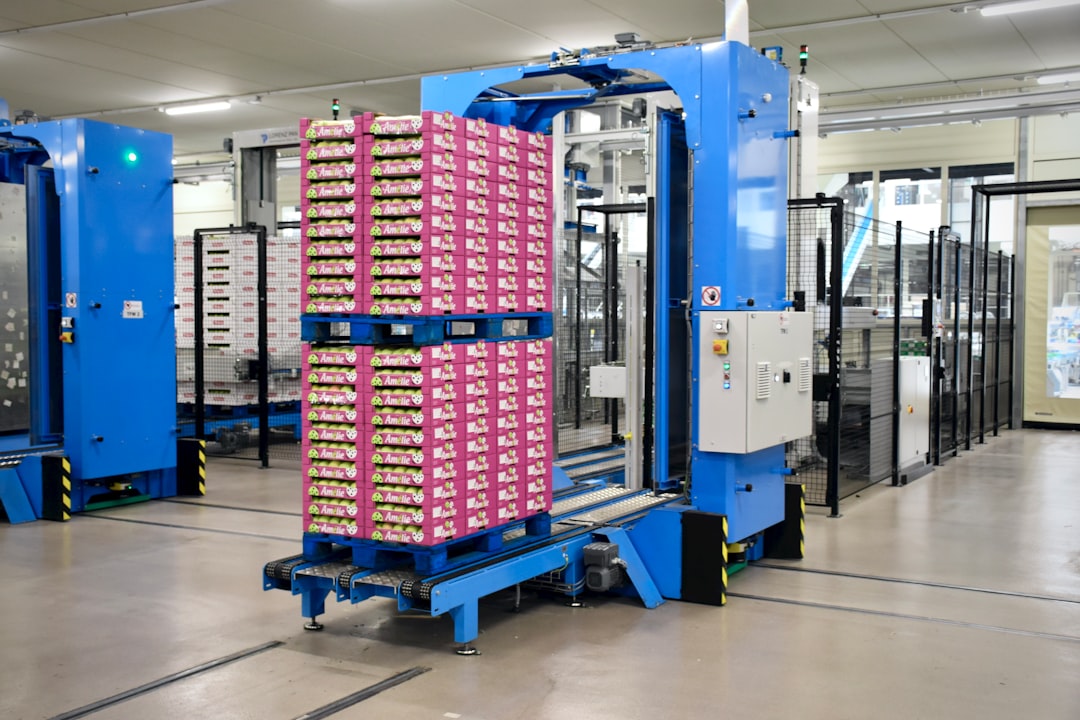SMS-iT Workflow Automation with AI is a cutting-edge technology that combines the power of automation and artificial intelligence (AI) to streamline and optimize business processes. Automation has become increasingly important in today’s fast-paced business environment, as it allows organizations to reduce manual tasks, improve efficiency, and enhance productivity. By integrating AI into workflow automation, businesses can further enhance their operations by leveraging intelligent algorithms and machine learning capabilities.
Key Takeaways
- SMS-iT Workflow Automation with AI streamlines business processes
- Benefits include increased efficiency, reduced errors, and improved customer satisfaction
- AI is integrated through machine learning algorithms that improve over time
- Successful case studies show significant improvements in productivity and cost savings
- Future advancements in AI will continue to enhance SMS-iT Workflow Automation
The Benefits of SMS-iT Workflow Automation
One of the key benefits of SMS-iT Workflow Automation with AI is increased efficiency and productivity. By automating repetitive and time-consuming tasks, employees can focus on more strategic and value-added activities. This not only saves time but also improves overall productivity within the organization. Additionally, automation reduces the risk of human error, as machines are less prone to mistakes compared to humans. This leads to improved accuracy and quality in business processes.
Another advantage of SMS-iT Workflow Automation with AI is the reduction in errors and costs. Manual processes are often prone to errors, which can result in costly mistakes and rework. By automating these processes, organizations can minimize errors and associated costs. Additionally, automation eliminates the need for manual data entry and paperwork, reducing administrative costs and improving operational efficiency.
Furthermore, SMS-iT Workflow Automation with AI can greatly improve customer satisfaction. By automating customer-facing processes such as order processing or customer support, organizations can provide faster response times and more personalized experiences. This leads to increased customer satisfaction and loyalty.
Moreover, SMS-iT Workflow Automation with AI enhances decision-making capabilities within an organization. By leveraging AI technologies such as machine learning and predictive analytics, businesses can gain valuable insights from large volumes of data. These insights can be used to make informed decisions and drive strategic initiatives.
How AI is Integrated into SMS-iT Workflow Automation
AI plays a crucial role in SMS-iT Workflow Automation by enabling intelligent decision-making and automation of complex tasks. AI refers to the simulation of human intelligence in machines that are programmed to think and learn like humans. In the context of workflow automation, AI algorithms are used to analyze data, make predictions, and automate decision-making processes.
There are several AI technologies that are commonly used in SMS-iT Workflow Automation. Natural Language Processing (NLP) is one such technology that enables machines to understand and interpret human language. This is particularly useful in automating customer support processes, where machines can analyze customer queries and provide relevant responses.
Another AI technology used in SMS-iT Workflow Automation is Machine Vision, which enables machines to interpret and understand visual data. This technology is often used in automating quality control processes, where machines can detect defects or anomalies in products based on visual inspection.
The Role of Machine Learning in SMS-iT Workflow Automation
Machine learning is a subset of AI that focuses on enabling machines to learn from data and improve their performance over time without being explicitly programmed. In the context of SMS-iT Workflow Automation, machine learning algorithms are used to analyze large volumes of data and make predictions or take actions based on patterns or trends identified in the data.
Machine learning is particularly useful in automating complex tasks that require decision-making based on historical data. For example, in supply chain management, machine learning algorithms can analyze historical sales data and predict future demand, enabling organizations to optimize inventory levels and reduce costs.
The benefits of machine learning in automation are numerous. Firstly, machine learning algorithms can process large volumes of data much faster than humans, enabling organizations to make real-time decisions based on up-to-date information. Secondly, machine learning algorithms can identify patterns or trends in data that may not be apparent to humans, leading to more accurate predictions or insights. Finally, machine learning algorithms can continuously learn and improve their performance over time, leading to more efficient and effective automation.
How SMS-iT Workflow Automation with AI Can Improve Efficiency
Automation in general improves efficiency by eliminating manual tasks and reducing the time required to complete a process. SMS-iT Workflow Automation with AI takes this a step further by leveraging AI technologies to automate complex tasks that would otherwise require human intervention.
For example, in the field of customer support, SMS-iT Workflow Automation with AI can automate the process of responding to customer queries. Instead of having a human agent manually read and respond to each query, AI algorithms can analyze the query, understand its intent, and provide a relevant response. This not only saves time but also ensures consistent and accurate responses.
Another example is in the field of data analysis. Instead of manually analyzing large volumes of data to identify trends or patterns, SMS-iT Workflow Automation with AI can use machine learning algorithms to automatically analyze the data and provide insights or predictions. This not only saves time but also improves the accuracy and quality of the analysis.
The Impact of SMS-iT Workflow Automation on Business Processes

SMS-iT Workflow Automation with AI has a significant impact on business processes. Firstly, it improves efficiency by reducing the time required to complete tasks and eliminating manual errors. This leads to faster turnaround times and improved overall productivity within the organization.
Secondly, automation improves accuracy and quality in business processes. By eliminating manual data entry and paperwork, organizations can reduce the risk of errors and ensure consistent and accurate results. This is particularly important in industries where accuracy is critical, such as healthcare or finance.
Furthermore, SMS-iT Workflow Automation with AI enables organizations to scale their operations without increasing their workforce. By automating repetitive tasks, organizations can handle larger volumes of work without the need for additional resources. This leads to cost savings and improved operational efficiency.
Case Studies: Successful Implementations of SMS-iT Workflow Automation with AI
There are several real-life examples of successful implementations of SMS-iT Workflow Automation with A
One such example is in the banking industry, where AI-powered chatbots are used to automate customer support processes. These chatbots can understand and respond to customer queries, provide account information, and even assist with transactions. This has led to improved customer satisfaction and reduced costs for banks.
Another example is in the manufacturing industry, where machine vision technology is used to automate quality control processes. Machines equipped with cameras and AI algorithms can inspect products for defects or anomalies, ensuring that only high-quality products are shipped to customers. This has led to improved product quality and reduced rework costs for manufacturers.
The Future of SMS-iT Workflow Automation with AI
The future of SMS-iT Workflow Automation with AI looks promising, with potential advancements and developments on the horizon. One potential advancement is the integration of robotic process automation (RPA) with A
RPA involves the use of software robots to automate repetitive tasks, while AI enables intelligent decision-making. By combining these two technologies, organizations can achieve even greater levels of automation and efficiency.
Another potential development is the use of AI-powered virtual assistants in SMS-iT Workflow Automation. Virtual assistants can understand and interpret human language, enabling organizations to automate tasks such as scheduling meetings or managing emails. This not only saves time but also improves productivity by offloading administrative tasks from employees.
How to Implement SMS-iT Workflow Automation with AI in Your Organization
Implementing SMS-iT Workflow Automation with AI in your organization requires careful planning and consideration. Here are some steps to help you get started:
1. Identify the processes that can be automated: Start by identifying the processes within your organization that are repetitive or time-consuming and can benefit from automation. This could include tasks such as data entry, document processing, or customer support.
2. Evaluate available technologies: Research and evaluate the available technologies that can enable SMS-iT Workflow Automation with A
Consider factors such as ease of integration, scalability, and cost-effectiveness.
3. Develop a roadmap: Create a roadmap for implementing SMS-iT Workflow Automation with AI in your organization. Define the goals and objectives of automation, identify the key milestones, and allocate resources accordingly.
4. Pilot and test: Start with a small-scale pilot project to test the effectiveness of SMS-iT Workflow Automation with AI in your organization. Monitor the results and gather feedback from employees to make any necessary adjustments.
5. Scale up: Once the pilot project is successful, scale up the implementation of SMS-iT Workflow Automation with AI across your organization. Train employees on how to use the new technologies and provide ongoing support and guidance.
Frequently Asked Questions about SMS-iT Workflow Automation with AI
1. What is the difference between automation and AI?
Automation refers to the use of technology to perform tasks or processes without human intervention. AI, on the other hand, refers to the simulation of human intelligence in machines that are programmed to think and learn like humans.
2. How can SMS-iT Workflow Automation with AI improve customer satisfaction?
SMS-iT Workflow Automation with AI can improve customer satisfaction by automating customer-facing processes such as order processing or customer support. This enables organizations to provide faster response times and more personalized experiences.
3. What are some potential challenges in implementing SMS-iT Workflow Automation with AI?
Some potential challenges in implementing SMS-iT Workflow Automation with AI include resistance from employees who fear job loss, integration issues with existing systems, and ensuring data privacy and security.
4. Can SMS-iT Workflow Automation with AI replace human workers?
SMS-iT Workflow Automation with AI can automate repetitive tasks and improve efficiency, but it cannot completely replace human workers. Human intervention is still required for tasks that require creativity, critical thinking, or emotional intelligence.
5. How can organizations measure the success of SMS-iT Workflow Automation with AI?
Organizations can measure the success of SMS-iT Workflow Automation with AI by tracking key performance indicators such as cost savings, productivity improvements, customer satisfaction ratings, and employee feedback.
If you’re interested in revolutionizing your customer relations and taking your business to the next level, you won’t want to miss this related article on SMS-iT CRM System. This game-changing solution from SMS-iT is designed to streamline your workflow and automate your customer interactions, saving you time and boosting productivity. With AI-powered features, SMS-iT Workflow Automation with AI takes customer relationship management to a whole new level. Check out the article here to learn more about how SMS-iT CRM System can transform your business.
FAQs
What is SMS-iT Workflow Automation with AI?
SMS-iT Workflow Automation with AI is a software solution that automates business processes using artificial intelligence and SMS messaging.
How does SMS-iT Workflow Automation with AI work?
SMS-iT Workflow Automation with AI uses AI algorithms to analyze data and automate business processes. It sends SMS messages to employees or customers to notify them of tasks or updates.
What are the benefits of using SMS-iT Workflow Automation with AI?
The benefits of using SMS-iT Workflow Automation with AI include increased efficiency, reduced errors, improved communication, and cost savings.
What types of businesses can benefit from SMS-iT Workflow Automation with AI?
Any business that relies on manual processes and communication can benefit from SMS-iT Workflow Automation with AI. This includes industries such as healthcare, finance, retail, and logistics.
Is SMS-iT Workflow Automation with AI easy to use?
Yes, SMS-iT Workflow Automation with AI is designed to be user-friendly and easy to use. It requires minimal technical knowledge and can be customized to fit the specific needs of each business.
What is the cost of SMS-iT Workflow Automation with AI?
The cost of SMS-iT Workflow Automation with AI varies depending on the size and complexity of the business. It is typically priced on a per-user or per-month basis.
Is SMS-iT Workflow Automation with AI secure?
Yes, SMS-iT Workflow Automation with AI is designed with security in mind. It uses encryption and other security measures to protect sensitive data and prevent unauthorized access.







